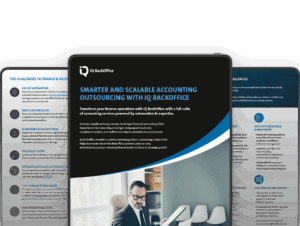Introduction
At the core of every successful business is a well-managed and accurate accounting system. Without a reliable process, among other considerations, a company’s financial health can quickly deteriorate, potentially leading to bankruptcy. However, maintaining an in-house accounting team can be a challenge for many businesses due to the corresponding associated costs and specialized skillsets required. That’s where accounting outsourcing comes in. It’s a business practice particularly taken by organizations as a strategic cost-cutting measure. This affects a wide range of jobs as it spans a variety of industries – ranging from customer service to manufacturing, and even back office, such as accounting.

As a business owner, choosing the right accounting firm to partner with can be a critical decision that can significantly impact the future of your company. It’s important to evaluate potential candidates and thoroughly understand your business’ specific needs before making this crucial decision. With the right company, you can save time, reduce overhead costs, and gain access to a range of services needed to drive your business toward success.
When it comes to choosing the right firm for your business, however, it can be difficult to know where to start. To help guide you through the process, we have compiled some tips and considerations for choosing an ideal one that matches your business.
Identifying Your Business Needs
Before embarking on a search, it’s crucial to define your accounting needs. Assess your current financial processes and identify the specific tasks you want to outsource. After all, a common reason for adopting an outsourcing model for some functions and processes is to optimize the distribution of the workload to free up talent and to focus on value-added strategic duties. This may include bookkeeping, payroll processing, tax preparation, financial reporting, or a combination of these services. Perhaps it can be transactional bookkeeping functions such as Accounts Payable and Accounts Receivable. Assess which areas in your processes you need solutions for such as specific software or technology weaknesses and pin down costs, turnaround time, and quality expectations for these. Whatever it may be, understanding your requirements will help you find a company with the right expertise and capabilities that align with your goals.
Reputation, Expertise, and Industry Knowledge
After identifying your specific needs, the process of evaluating potential outsourcing providers begins. It is critical to verify their expertise and reputation in addition to considering any existing industry knowledge. Look for their experience in your business niche, their reputation in the industry, and their track record of delivering high-quality services within set timelines. One with experience in your industry may very well be familiar with the specific accounting regulations, compliance requirements, and industry best practices you need. A partner who understands the intricacies of your sector can provide valuable insights and ensure accurate financial reporting. You can gain insights and check their legitimacy by reviewing their website, online reviews, and portfolio.
Evaluate the company’s qualifications, certifications, and expertise of their team. Certified Public Accountants (CPAs) or qualified accountants with relevant professional certifications demonstrate a commitment to excellence and high-quality standards. Additionally, inquire about their ongoing training programs to ensure their team remains up to date with the latest accounting standards and technologies.
Track Record
Track record is also a crucial factor to consider. Look for success stories from identical industries to gauge if their relationship and solutions are aligned with the needs you have based on your own audit. They should be able to provide you with detailed testimonials, online reviews, or case studies highlighting their value-adding services to other similar businesses. This will enable you to evaluate their quality of work and client satisfaction, compare their services and pricing within the market, and confidently make an informed decision. A reputable partner will have a history of delivering exceptional services and maintaining strong client relationships.
Consider their longevity in the industry. A well-established company with a proven track record indicates stability and reliability. Request references from clients who have similar business models or requirements as yours. Speaking directly with their clients will provide valuable insights into their performance, process, responsiveness, and ability to meet deadlines.
Data Security and Confidentiality
Data security and confidentiality are important in any company whatever the industry – however, the importance cannot be overstated enough when introducing BPO partners into your portfolio. You must ensure that your financial information remains secure and protected. Inquire about their existing data security measures, such as encryption protocols, secure servers, and access controls. They should have robust safeguards in place to prevent unauthorized access, data breaches, or data loss as they handle vast amounts of sensitive data including financial records, customer and employee information, and intellectual property.
Ask about current policies and procedures for handling sensitive information and client data. A reliable outsourcing company will have stringent confidentiality agreements in place, requiring its staff to maintain strict confidentiality standards. It’s a must for non-disclosure agreements (NDAs) to be part of the contract to protect your business’ sensitive financial information.
Scalability and Flexibility
As your business grows, your accounting needs may change. Therefore, it’s crucial to choose an outsourcing provider that can scale its services to meet your evolving requirements. Inquire about their capacity to handle an increased workload or additional services when necessary.
Flexibility is another essential aspect to consider. A service provider that can adapt to your business’ changing needs, accommodate customization requests, and integrate with your existing systems will ensure a smooth and seamless outsourcing experience. Discuss their approach to handling special projects or unique requirements to ensure they can provide tailored solutions.
Communication and Support
Effective communication and support are vital for a successful outsourcing partnership. Assess communication channels and responsiveness. Determine how accessible they are and how they handle queries or concerns. Open lines of communication and regular updates are essential for maintaining transparency and addressing any issues promptly.
Inquire about their customer support and account management structure. A dedicated account manager who understands your business and acts as a point of contact will streamline communication and ensure a personalized approach to your needs.
Location and Time Zone
It is perfectly acceptable to opt for a provider outside of your time zone and geographic region. This opens up a wider range of choices and helps to ensure that you have access to a wider range of services. By finding the right service provider, you can get more efficient support, high-quality work, and a reputation for reliability. In addition, the advantages of having a team based in a different time zone may counterbalance the disadvantages of operating remotely. This means you can have team members working in different time zones, and thereby gain a 24-hour support system. You also get to benefit from more cost-effective services and greater expertise.
Customized Solutions
Each business has unique finance requirements. It would be to your advantage if your accounting outsourcing partner is able to offer customized solutions tailored to your specific needs. It is noteworthy when the service provider takes time to understand your business processes and customize their services to meet or exceed your expectations. Invest in one that will focus on your business’ particular challenges and opportunities, with a deep understanding of your financial operations and business aspirations.
Cost Structure
The cost of outsourcing services is a crucial factor that businesses better carefully consider. Different providers have distinct pricing models since the cost is influenced by various factors. These include the finance services your business requires, the location of your potential partner, the experience and qualifications of their staff, and the level of customization required. Get clarification on their fee structure, the billing frequency, and the contract terms before hiring the BPO company.
Conclusion
Finding the right company to partner with is an important process and must not be taken lightly. It requires careful evaluation of your business needs and a stringent search for a BPO provider with customized solutions that meet your budget and expectations. Take the time to evaluate multiple potential service providers, compare their offerings, and make the necessary inquiries. By following these tips and factors, you stand a better chance of finding the right fit for your organizational needs.
How to Choose the Right Accounting Outsourcing Partner for Your Business: FAQs
Are You Considering an Accounting Outsourcing Partner? IQ BackOffice Can Help.
Here at IQ BackOffice, we provide financial business process outsourcing for large and mid-sized enterprises. We serve a range of diverse industries, including manufacturing and distribution, healthcare and dental, restaurant and hospitality, energy, retail, and technology. Our solutions enable companies around the globe to automate and streamline the complex financial processes they manage.
IQ BackOffice reengineers financial processes to take advantage of best practices and leverage state-of-the-art automation. This allows us to remove manual or inefficient steps, delivering improved controls and up to 70% cost savings for our clients.
To find out more about how IQ BackOffice can reduce costs and streamline your Accounts Payable function, get in touch with us.
Read More about IQ BackOffice offerings:
How Can Outsourcing Accounting Make Accounting Departments More Efficient?
Is it Time for your Company to Consider Outsourcing Financial Operations?
The Future of Business Payments – 5 Post-Pandemic Best Practices
Business Process Outsourcing, and a Closer Look at Accounts Payable
Accounting Automation and Outsourcing – Top 5 Rookie Mistakes
What is AP Automation and Does It Work On It’s Own?
Outsourcing Accounting Processes – Does It Actually Save Money?







